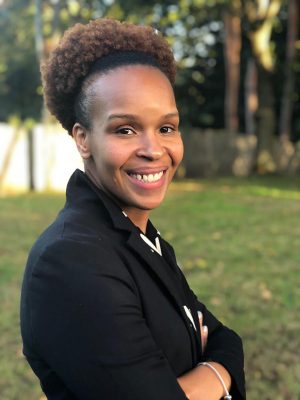In the midst of national headlines about undocumented immigrants and U.S. Immigration and Customs Enforcement, Northeastern University professor Tiffany Joseph visited Boston University Monday to discuss her research on how factors such as race and culture affect the health care latinx immigrants receive in the United States.

Before sharing the results of her case study, Joseph, a professor of sociology, explained the Latinx Health Paradox. When these immigrants first come to the U.S., she said, they are often in a better state of health than American citizens, but over time their health gets worse.
“Living in the U.S. is making people sicker,” Joseph said during the talk at the Department of Sociology.
The goal of the project is to understand how federal and state policies affect people in their daily lives, Joseph wrote in an email after the seminar.
“I focus specifically on health policy in this project and how documentation status shapes individuals’ ability to obtain (or not) health coverage under the Massachusetts and Affordable Care Act … health reforms,” Joseph wrote.
Joseph said in the talk that she conducted 153 “semi-structured” interviews with anonymous immigrants, healthcare providers and employees of immigrant health organizations. After interviewing Brazilians and Dominicans for the 2012-13 sample, Joseph said she added Salvadorans to the 2015-16 sample.
Only five of the interviews were conducted in English, she said, and the surveyed immigrants were of varying documentation status. They represented three of the largest immigrant populations — from Brazil, the Dominican Republic and El Salvador — in the Boston metropolitan area, she noted.
Joseph said during the talk that each of the three groups are racialized differently. Brazilian immigrants, many of whom come from a working-middle class in Brazil, are often seen as white, according to Joseph.
Dominicans, who are often green card holders, may be perceived as black, and Salvadorans, who often have undocumented or temporary protected status, may appear latinx.
The different racializations affect their access to healthcare, she said.
A Salvadoran pastor in Joseph’s 2015-16 study told her that with a legal status, it is easier for immigrants to purchase a plane ticket to return to their home countries for treatment, but many who are undocumented rely on self-medication.
Joseph said many of the medications that immigrants’ family and friends send to the United States are not FDA approved and infections can occur as a result of procedures done when immigrants travel home.
A Dominican immigrant from Joseph’s 2012-13 sample said she “tries to go to Hispanic clinics” in the United States because the doctors understand her culture and way of thinking, Joseph said.
Grace Melo, a junior in the Boston University’s Wheelock College of Education and Human Development, is the daughter of Brazilian immigrants from Rio De Janeiro.
Melo said because her parents became citizens soon after their arrival in the 1980s, her family hasn’t had any issues with healthcare. She said that seeing a doctor in the United States is ideal for her family because healthcare in Brazil is under-resourced and under-funded.
“When the opportunity [to receive treatment] comes, they do jump on it, as opposed to risking more dangerous or alternative practices,” Melo said.
However, Melo said, a relative went back to Brazil for an alternative, natural treatment for alcohol addiction instead of attending a rehab program here.
Joseph said she is currently in the field doing her final set of interviews, which will look at the implications of the 2016 election and how data on immigrant healthcare practices may have changed as a result of the U.S. President Donald Trump’s administration.
Before the 2016 presidential election, a healthcare advocate in the 2015-16 set told Joseph that the prospect of Trump’s plan “really does create a culture of fear in some immigrant communities.”
Even if people have legal status, they “stay in the shadows, they don’t want to apply for coverage.”
The current socio-political climate has generated an increase in health disparities, Joseph said.
Deborah Carr, chair of BU’s Sociology Department, said she believes the way Joseph merged the topics of health and immigration is very timely.
“We’re living in a climate of inhospitable immigration policy,” Carr said. “Immigrants who are not documented, who require healthcare … are not going to the hospital, they’re not going to healthcare providers because they’re so worried.”
Joseph wrote in an email that sociology is important to study because it covers every aspect of the human experience.
“With all of the pressing social problems our global society is facing,” Joseph wrote, “sociology provides a way to better understand those problems and how they affect us as humans.”




















































































































